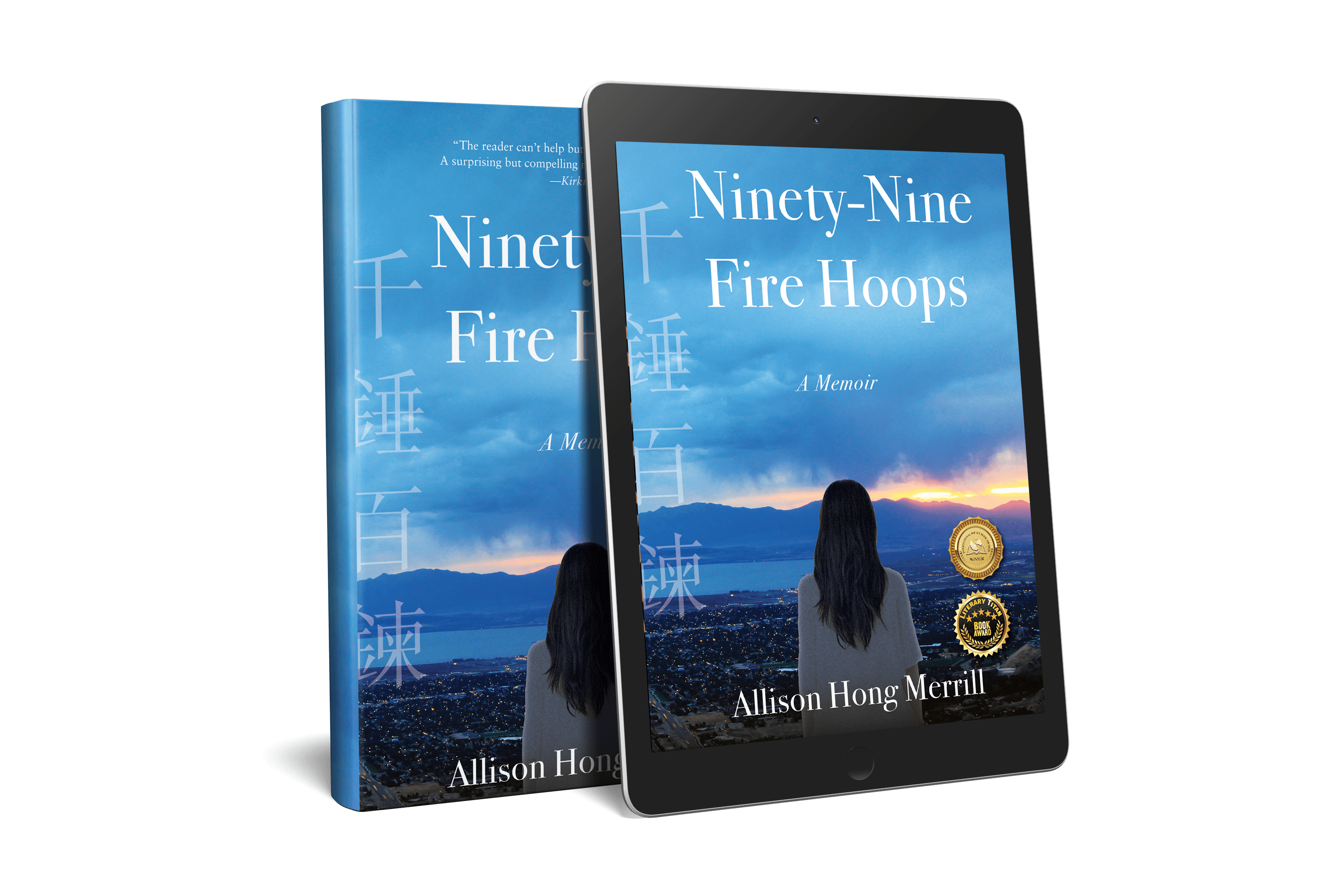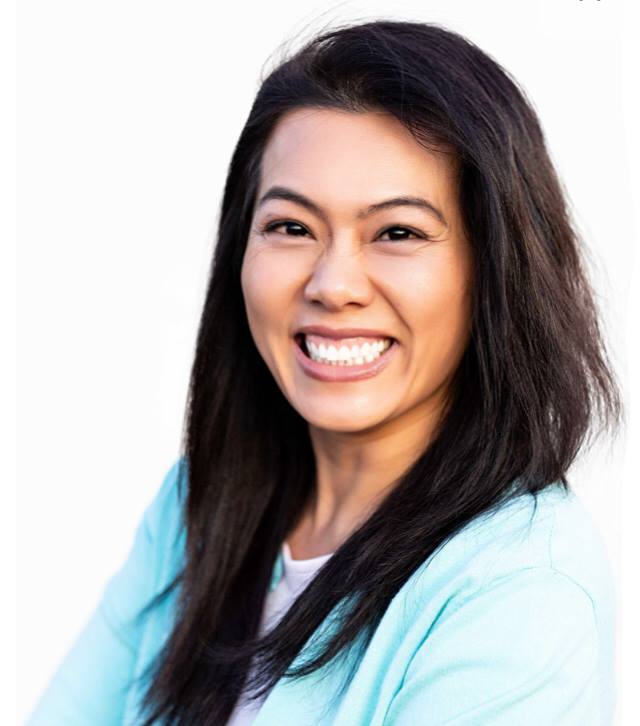
Ninety-Nine Fire Hoops
Allison Hong is not your typical fifteen-year old Taiwanese girl. Unwilling to bend to the conditioning of her Chinese culture, which demands that women submit to men’s will, she disobeys her father’s demand to stay in their faith tradition, Buddhism, and instead joins the Church of Jesus Christ of Latter-day Saints. Then, six years later, she drops out of college to serve a mission—a decision for which her father disowns her. After serving her mission in Taiwan, twenty two-year-old Allison marries her Chinese speaking American boyfriend, Cameron Chastain. But sixteen months later, Allison returns home to their Texas apartment and is shocked to discover that, in her two hour absence, Cameron has taken all the money, moved out, and filed for divorce. Desperate for love and acceptance, Allison moves to Utah and enlists in an imaginary, unforgiving dating war against the bachelorettes at Brigham Young University, where the rules don’t make sense—and winning isn’t what she thought it would be.
About the Author

ALLISON HONG MERRILL
Allison was born and raised in Taiwan and arrived in the U.S. at age twenty-two as a university student. That’s when she realized her school English wasn’t much help when asking for directions on the street or opening a bank account. By recording each of the classes she took––including physical education––and reviewing the tape every night for a year, she eventually learned English well enough to earn an MFA in Writing from Vermont College of Fine Arts. But please excuse her if she misuses the verb tenses or mixes up the genders in third-person pronouns when she speaks. It’s no secret––English is a hard language to learn.
INTERVIEW WITH THE AUTHOR
TELL US A LITTLE BIT ABOUT YOURSELF.
AHM: I was born and raised in Taiwan and came to the U.S. at twenty-two as a university student. That’s when I realized my school English wasn’t much help when asking for directions on the street or opening a bank account. By recording each of the classes I took and reviewing the tape every night for a year, I eventually learned English well enough to earn an MFA from Vermont College of Fine Arts. But please excuse me if I misuse verb tenses or mix up genders in third-person pronouns when I speak. It’s no secret––English is hard to learn.
With a reading disorder, I write in both Chinese and English, both fiction and creative nonfiction, which means I spend a lot of time looking up words on Dictionary.com. My work appears in The New York Times and has won both national and international literary awards. I’m a keynote speaker, an instructor, and a panelist at various writer’s conferences nationwide and in Asia. I also appear on TV, radio, and podcasts; in magazines, newspapers, and journals. Ninety-Nine Fire Hoops is my debut memoir.
Tell us a little bit about your memoir Ninety-Nine Fire Hoops.
AHM: Ninety-Nine Fire Hoops has similar themes as Tara Westover’s Educated and Frank McCourt’s Angela’s Ashes. It’s about the power of choice, illustrated by my experience as a Taiwanese immigrant bride––disowned by my father, abandoned by my American husband, and inarticulate in English––determined to create my own destiny in a foreign country.
Did you always know you were going to write your story?
AHM: Yes and no. I struggle with a reading disorder, so reading and writing are hard work for me. But I had always wanted to tell my story. My husband and I have three sons together. When they were little, I told them my childhood experiences in Taiwan. It was a special bonding time as we laughed together at the silly things I did as a kid. In 2006, one night, out of nowhere, a thought came to me that I should write a memoir, a gift to my children, a legacy project. Looking back, I understand that for someone with a reading disorder to write a book in a foreign language, it must have been a calling. I answered that call. Sixteen years later, here I am–– grateful, grateful, and grateful for the opportunity to tell my story.
Ninety-Nine Fire Hoops covers a lot of heavy emotions from rough experience of family, independence, and finding yourself. Tell us a little bit about your journey writing about your personal story through these emotions.
AHM: When I wrote about traumatic experiences and unpleasant memories, hurt feelings inevitably returned. In those moments, I stopped writing and, instead, conducted an imaginary interview with the characters and tried to understand the motives behind their choices and behaviors. It helped me distance myself from the negative emotions that could easily have destroyed my inner peace. I learned that it’s always best to assume everyone is doing his or her best––even the antagonist in my story.
As a little child, whenever something bad happened, I told myself all I had to do was to hang on until bedtime–– everything would be all right then. I believed bad things couldn’t follow me into my dream, so as long as I stayed asleep, I would be safe in a different reality.
For me, remembering and reliving my journey was like being in a dream. Whenever I felt hurt or angry or scared, the dream became a nightmare. If it became too much to bear, I would wake up and end it.
I wrote Ninety-Nine Fire Hoops when I was in my forties. By then I was more mature than the twenty-something me, and I had developed more compassion for others. During the writing process, I imagined doing an interview with each of the characters in my story, and imagined what their answers would’ve been, and it dawned on me that everyone struggles with something, everyone has his/her cross to carry. It’s not my job to judge. The only way for me to find inner peace is to believe everyone is doing his/her best. After all, we’re imperfect humans living in a fallen world. We make mistakes and fall short. We could all use loving mercy and second chances.
Your memoir takes readers through your long struggles with depression and give them a look at some of your lowest lows. How did it feel to write about yourself in this exposed way? Wasn’t it strange to let people see those aspects of yourself?
AHM: I believe all human beings want to belong, to love, and to be loved. None of us have perfect lives. When we seek to empathize with others who also experience challenges and imperfections, it helps us to feel that we’re not alone in our own struggles. That’s a beautiful gift memoirs offer–– raw, true, vulnerable stories that readers resonate with and relate to. It was uncomfortable to expose my weaknesses and shortcomings in my memoir, but my readers have reached out and told me the part of my story that touched them the most was from my lowest of lows. It gave them hope and courage to face their own challenges. As a writer, I knew no greater joy than that.
Who/What has had the most influence on you when writing Ninety-Nine Fire Hoops?
AHM: My husband and our three sons.
What do you hope reader get from reading your memoir?
AHM: Life is a summary of your choices. Choose to be obsessed with love and kindness.
What’s next?
AHM: I’m working on two projects simultaneously:
1. a memoir titled Ninety-Nine Lost Fathers. It’s about a 100-year multigenerational family saga set in Taiwan that starts with an arranged matrilocal marriage and ends with an interracial marriage. Ninety-Nine Lost Fathers can be a stand-alone book or the prequel to Ninety-Nine Fire Hoops.
2. a contemporary novel titled Six Sage Society. Set in Mongolia/China, Utah, and Meesing Island, Six Sage Society is a Chinese imperial family saga with a secret and a prophecy originated in 771 B.C. It’s the Chinese/Mongolian version of Game of Thrones of how a young woman discovers that she’s the rightful heir to the throne of an ancient Chinese imperial court.

Continue Reading
Article originally Published in the December/January 2023 Issue “2022 Indie Best Award Winners”
